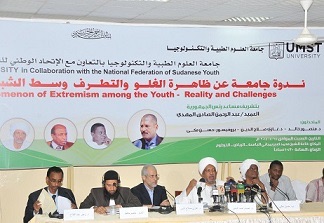Security approach doesn’t address root causes of religious extremism: symposium
August 15, 2015 (KHARTOUM) — The chairman of the board of trustees of the University of Medical Sciences and Technology (UMST), Mamoun Humaida, denied that his university has become an incubator for religious extremism in the country.
 Humaida, who is also the health minister in Khartoum state, was among a panel of speakers who discussed the challenges posed by the phenomenon of hyperbole and extremism in a symposium organized by the UMST on Saturday.
Humaida, who is also the health minister in Khartoum state, was among a panel of speakers who discussed the challenges posed by the phenomenon of hyperbole and extremism in a symposium organized by the UMST on Saturday.
Last March, British media outlets confirmed reports that nine medical students from Sudanese origins who are enrolled at the UMST entered Syria via Turkey to work in hospitals under the control of ISIS.
Also another batch comprised of 18 medical students from the UMST secretly flew to Turkey last June to join ISIS.
Humaida said the UMST would take precautionary measures starting next month to stop the students from joining ISIS without elaborating on the nature of those measures.
He said the phenomenon of extremism can’t be confined to UMST alone as some people are trying to do, pointing that hundreds of high school and college students have joined ISIS.
Humaida said they have warned the parents of students against changes in their sons’ behaviors, saying they students have been recruited outside the boundaries of the UMST.
He called for conducting deep studies in order to discover the “magnetic power” that enabled ISIS to attract the youths.
BRITISH ADVISES
The United Kindom Charge d’Affaires in Khartoum, Kate Raad, said the students joined ISIS after watching videos containing misconceptions, noting that extremism has caused great damage to the image of Islam.
She disclosed that her embassy would offer booklets including guidance materials and tips to the families of the students who joined ISIS, saying the UK can’t prevent anyone from embracing any ideas but can only offer advises and engage in dialogue with the youth.
Meanwhile, the presidential assistant, Abdel-Rahman al-Mahdi, expressed the government keenness to fight extremism, pointing to the need for dismantling the religious incumbent which gave terrorism its legitimacy.
“Terrorism and hyperbole are products of ignorance and shallowness and when the young people don’t find the role models they seek to fill the gap by following those [terrorist] groups,” he added”.
He added that 80% of the students who joined ISIS hold foreign passports.
BIAS OF THE WEST
The head of the Islamic Fiqh Academy, Isam Ahmed al-Bashir, for his part, pointed to the misconceptions held by the youth who joined ISIS including their definition for the concept of Jihad (holy war).
He called for engaging in dialogue with the extremist groups in order to correct the misconceptions, demanding that the Islamic Movement (IM) undertake more efforts to rectify the concepts held by the extremist groups.
Al-Bashir accused the western media of using double standards in dealing with extremism.
“When Oklahoma bombings took place, the action was not ascribed to Christianity and when Ghandi was killed, the action was not ascribed to Hinduism,” he said.
He said the West supports dictatorships and opposes democratic regimes according to its interests, accusing it of insulting Islam in the name of liberties.
He pointed that youths in the Islamic world are desperate because they don’t find role models and when ISIS raised the slogan of “Islamic Caliphate” it touched upon their dreams.
Al-Bashir stressed that the problem cannot be only addressed by security measures and needs to be tackled at the level of thoughts and ideas.
WARNING AGAINST OPPRESSION
The leader of the Reform Now Movement (RNM), Ghazi al-Attabani, said religious extremism was a result of social and international circumstances, noting the Islamic world lacks a command and control centre.
He pointed the young generations need to get familiar with the achievements of the modern civilization, calling for reforming the international order and avoiding oppression and injustices.
Al-Attabani also called for not only adopting the security approach in dealing with the phenomenon of extremism.
BA’ATHIST IN ISIS
The Islamist figure and college professor, Hassan Mekki, for his part, posed several questions such as: Does belonging to ISIS constitute a crime? Is it better for a young person to join ISIS or to become a drug addict?
He pointed that even the Ba’athists in Iraq have joined ISIS, saying the terrorist group has huge financial resources.
Mekki expected that the United States would eventually be forced to deal with the moderate factions within ISIS, warning against the literal interpretations of the religious texts.
He described the current situation in the Middle East as the era of the “creative chaos” which was propagated by the former US secretary of state Condoleezza Rice.
He said that tyranny represents the major problem in the Islamic world, pointing if the students who joined ISIS were destined to survive and come back, they would lead this country.
(ST)
